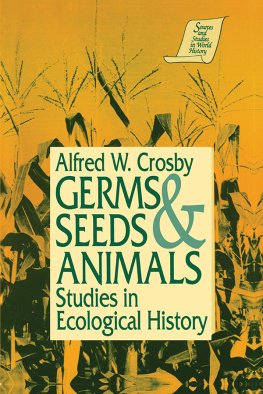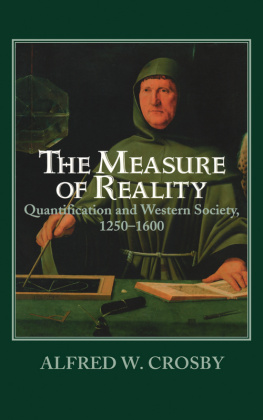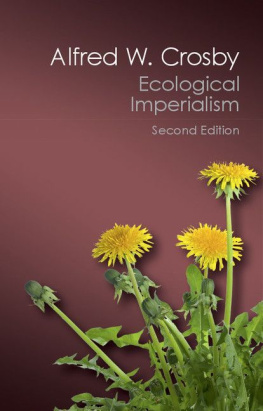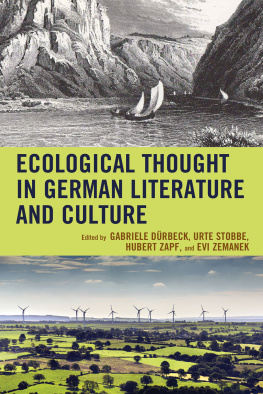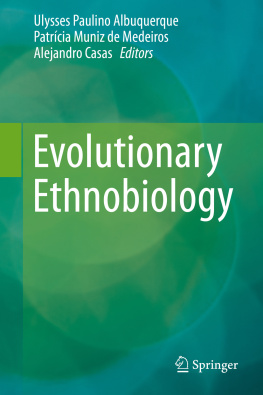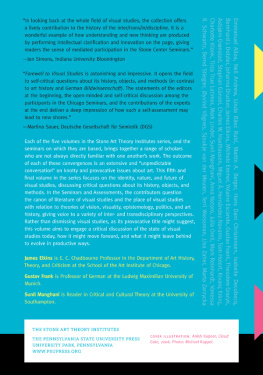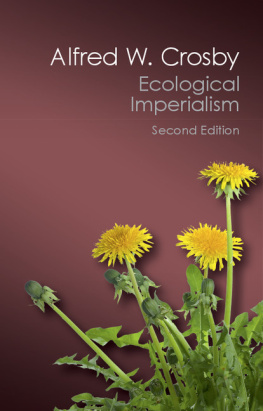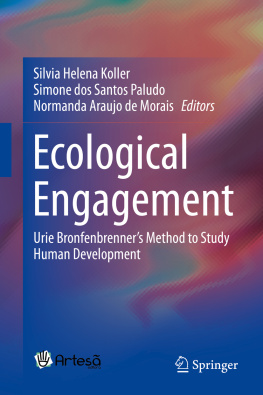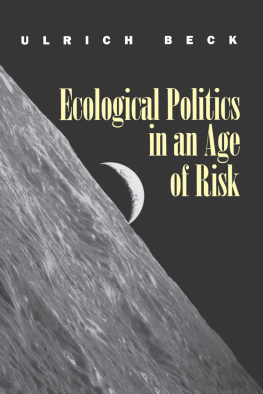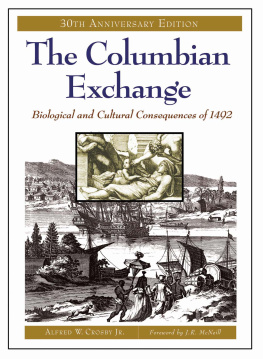& GERMS
SEEDS
ANIMALS
Kevin Reilly, Series Editor
THE ALCHEMY OF HAPPINESS
Abu Hamid Muhammad al-Ghazzali translated by Claud Field Revised and annotated by Elton L. Daniel
LIFELINES FROM OUR PAST
A New World History
L. S. Stavrianos
NATIVE AMERICANS BEFORE 1492
The Moundbuilding Centers of the Eastern Woodlands
Lynda Norene Shaffer
BALKAN WORLDS
The First and Last Europe
Traian Stoianovich
Alfred W. Crosby
& GERMS
SEEDS
ANIMALS
Studies in Ecological History
First published 1994 by M.E. Sharpe
Published 2015 by Routledge
2 Park Square, Milton Park, Abingdon, Oxon OX14 4RN
711 Third Avenue, New York, NY 10017, USA
Routledge is an imprint of the Taylor & Francis Group, an informa business
Copyright 1994 Taylor & Francis. All rights reserved.
No part of this book may be reprinted or reproduced or utilised in any form or by any electronic, mechanical, or other means, now known or hereafter invented, including photocopying and recording, or in any information storage or retrieval system, without permission in writing from the publishers.
Earlier versions of the following chapters in this work appeared in other publications and are included here with permission: was first published in Ben Finney and Eric Jones (eds.), Interstellar Migration and the Human Experience, 210219 (University of California Press, copyright (c) 1985 the Regents of the University of California).
An earlier version of in Revue Francaise dEtudes Americaines (No. 4849: AprilJuly 1991.).
Library of Congress Cataloging-in-Publication Data
Crosby, Alfred W.
Germs, seeds, and animals: studies in ecological history / Alfred W. Crosby.
p. cm. (Sources and studies in world history)
Includes bibliographical references and index.
ISBN 1-56324-249-4 (C). ISBN 1-56324-250-8 (P)
1. Human ecologyHistory. 2. EpidemicsHistory. 3. EuropeansMigrations. 4. ImperialismHistory. 5. Human geography. 6. Biogeography.
I. Title. II. Series.
GF50.C77 1993
304.2dc2093-19629
CIP
ISBN 13: 9781563242502 (pbk)
ISBN 13: 9781563242496 (hbk)
World history and ecological history are both ancient subjects that are undergoing a modern renaissance. We may date world history from the cross-cultural concerns of Herodotus and ecological history from Thucycdides detailed account of the plague at Athens. But both types of history were supplanted by theological and philosophical modes of discourse in subsequent centuries. By the first half of the twentieth century, world history was virtually synonymous with philosophical speculation, and ecological history barely existed at all. Only recently have they reemerged, both as empirical and scientific studies, in the age of social science and microbiology.
That the two should regain a mission and a following in recent decades is a testament to the historical imagination as much as to the power of science. Alfred Crosby almost alone redirected the attention of historians to ecological issues that were important precisely because they were global. In doing so, he answered those who believed that world history had become impossible as a consequence of the postwar proliferation of new historical specialities, including not only ecological history but also new social histories, areas studies, histories of mentalities and popular cultures, and studies of minorities, majorities, and ethnic groups.
In the introduction to this volume, Professor Crosby recounts an intellectual path to ecological history that might stand as a rationale for world history in general. He simply decided to study the most perva-sive and important aspects of human experience. By focusing on human universale like death and disease, his studies highlight the epidemic rather than the epiphenomenal.
There is a level of courage in the work of Professor Crosby that may not always be appreciated. He consistently tackles the obvious and the ordinary, that which the common wisdom has deemed already known or of no account. To reexamine Columbus and to see the crucial historical impact of germs and seeds (as he does in this volume), or to explore pidgin and Creole syntax (as he does elsewhere), are daring routes to knowledge that also ennoble the ordinary. Professor Crosby has called our attention to the things under our noses by the force of his words as well as the logic of his argument. In coining some of the most memorable categories of world historythe Columbian exchange, ecological imperialism, neo-Europeshe has enriched our language as well as our inquiries.
Alfred Crosby would never sanction a science that was more democratic than true, and he has no interest in celebrating all he surveys. But in the generosity of his range, his healthy intellectual skepticism, and the tenor of his prose, we might well think of him as the Walt Whitman of world history.
Kevin Reilly
INTRODUCTION:
NERDS VERSUS TWITS
A generation ago the English physicist, civil servant, and novelist C.P. Snow pointed to the deplorable division of the educated classes into two societies, the followers of the liberal arts and those of the sci-ences.1 Little has happened since to narrow the gap between the two: in fact, now we might better call it a chasm. Scientists look upon historians, for instance, as (1) methodologically sloppy, i.e., concerned with matters that defy measurement, and (2) devoted to things that are, well, often entertaining, but somehow, dont you know, beside the real point. The first problem may be incurable, considering the poor quality of the poor twits data, but at least they could concentrate on something more worthwhile than, for instance, Abraham Lincolns sense of humor.
A good many historians return the compliment by looking upon scientists as nerds fixated on physical minutia, blind to the most important elements of life, which are attitudinalthat is to say, moral, ethical, aesthetic, and intrinsically unquantifiable. Some historians go so far as to look upon scientists as T.S. Eliot looked upon Sweeney, who says to Doris, probably while crushing out his cigar in the yolk of her breakfast egg,
Birth, and copulation, and death.
Thats all the facts when you come to brass tacks:
Birth, copulation, and death.2
I have, of course, caricatured both scientists and historians. Few of either group are quite that bigoted. Butand I insist upon thissome are, and the rest, in their secret hearts, conceal elements of these prejudices. I am sure I could get the votes of the majority of scientists and historians on a secret ballot if I offered the former the proposition that historians are twits and the latter the proposition that scientists are nerds.
Where do I stand? As a historian, I am a professional twit and I of course share the standard views of my colleagues. But, frankly, as a human being, I lean toward the nerds. Yes, there is much more to life than birth, copulation, and deathbut the history of a species, no matter what else it may be,

